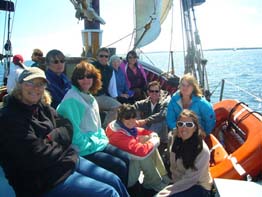For Immediate Release
July 14, 2011
The Community Schools at Opportunity Farm and Camden: A Merger to Help More Maine Youth
Two Maine organizations, over 139 years of experience, one goal: to provide Maine youth with an opportunity for growth and to achieve their full potential.
NEW GLOUCESTER, Maine – The new chair of the board, Fredric W. Williams, announced today that The Community School of Camden has merged with Opportunity Farm to create “The Community Schools at Opportunity Farm and Camden.”
The merger has been carefully planned for over two years. Both organizations have shared the same goal of encouraging life-long learning and providing students with the skills and experiences necessary to connect with their families, practice personal responsibility, and contribute to their communities. Dr. Dorothy Foote has been named the new Head of School. The transaction represents a $1.6 million combined budget. “On behalf of the entire board of trustees, I am very pleased to celebrate this day,” said Williams. “We have gone through an extremely thorough process to prepare for this merger, and I am confident that we will be able to serve more Maine youth in a more effective manner.”
“We have created a program at The Community School with a proven track record of success in educating teenagers by meeting them where they are, rather than expecting them to fit into the mold of a traditional classroom. Through this merger we are expanding our program to serve more Maine youth,” Foote said.
In 2009, Opportunity Farm’s board of trustees realized that a new way of working with youth would revitalize the entire organization, while at the same time improving results and decreasing the cost per student. Through a ‘request for proposals’ process, Opportunity Farm’s board contracted with Carole Martin and Common Good Ventures (CGV) to begin a discussion about changing its residential programs. Opportunity Farm and CGV looked at different program models designed to best support underserved adolescents in Maine. They researched what the trends around these youth were, what they needed to be successful, which parts of the state needed assistance, current graduation rates, and other data in order to identify how to make the biggest impact. Through an extensive process, Opportunity Farm realized that what kids need in the 21st century is a high school diploma that focuses on the whole individual.
In the summer of 2010, Opportunity Farm and CGV sought potential partners and interviewed seven organizations in their desire to find the best match. Because of its strong track record in keeping kids in school, its ability to cost-effectively deliver high quality services, and its visionary leadership, the board decided that The Community School was the best possible partner for the future, and in ensuring the best possible outcomes for the broadest number of Maine youth.
“It is my belief that the two organizations are bringing highly complementary strengths together and they have all the essential elements for success,” stated Carole Martin, a respected organizational consultant from Rockland who represented CGV in the merger process. “They have done an enormous amount of hard work to ensure a smooth transition. The future is bright.”
The Community School, Maine’s first alternative high school, was founded in 1973 by Maine educators Dora Lievow and Emanuel Pariser and provides two core programs: a nine-month Residential Program, and a home-based Passages program for teen parents, both of which culminate in a state of Maine approved high school diploma. “Our use of restorative justice practices, strengths-based work and Positive Youth Development provides some of the greatest support of adolescent success today,” Foote said.
Both The Community School and Opportunity Farm agree that the best way to support at-risk youth is to provide high quality access to education. Both organizations have also placed heavy emphasis on community service and community engagement. This entails everything from volunteering with the local fire department, to serving as after school mentors, to engaging with the natural world and learning how to become more environmentally conscious. As one Community School graduate stated, “Students graduating know how to hook into a community and become civically engaged. They learn to invest not only in themselves but in their world.”
The merger honors Opportunity Farm’s 100 year history of serving Maine youth, while bringing The Community School’s successful program model to a second campus and allowing the combined entity to serve many more adolescents in Maine.
The majority of the school’s funding comes from grants and fundraisers. The Community School never turns a student away due to an inability to pay, and tuition assistance and scholarships are available. The newly formed Community Schools at Opportunity Farm and Camden will provide opportunities for more than 60 students during the first year of operation.
The Community School brings an experienced and pioneering team of educators led by Dr. Foote, as well as a strong track record of success in working with Maine youth in innovative ways. Dr. Foote has years of research experience in adolescent psychology and the development of social justice programs, and serves as an adjunct professor of adolescent psychology at The University of Maine.
The Community School at Opportunity Farm will give many at-risk adolescents in Maine the tools they need to reach their potential and become confident, actively involved members of their communities. Not only will this merger prove to be an asset to the students, but it will also enhance the local communities and the state of Maine.
Other documents from merger press conference July 14, 2011
Program for merger press conference held July 14, 2011
Descriptive overview of newly merged schools
Restorative justice overview as foundation of new schools
Background on leadership / administration of new schools
Facts about new schools

Augusta, Gone by Martha Tod Dudman
Augusta, Gone
by Martha Tod Dudman
My daughter left three days ago.
‘I’m not telling you where I am,’ she says when she finally calls. ‘Don’t try to find me.’
So begins Martha Tod Dudman’s book, Augusta, Gone, the story of her daughter’s troubled adolescence. Dudman, a single mother, raised her son & daughter in a small town on the coast of Maine, where she thought she was giving them a pretty good childhood, but at 11 or 12, her daughter, Augusta, began getting in trouble. Just little things at first — she was in trouble at school, she was lying, she was smoking. But by the time she was fifteen she was totally out of control. By then she was into drugs and alcohol, disappearing for days at a time, stealing, cutting herself — she had dropped out of school.
Augusta, Gone follows Dudman’s search for help for her daughter, which included stints in a rugged wilderness program, a treatment center in Oregon, and a nerve-wracking period when her daughter was missing altogether. Finally, Augusta returned to Maine, where she enrolled at the Community School and found the support and encouragement she needed to earn her high school diploma.
Parents who have lived through similar situations with their teenage children will appreciate the honesty with which Dudman explores her feelings of love, guilt, anger, despair, and hope.

The Community School Staff
” The common sense and the uncommon compassion of the Community School has improved hundreds of young lives and enriched the surrounding neighborhoods.”
– Former U.S. Senator George J. Mitchell